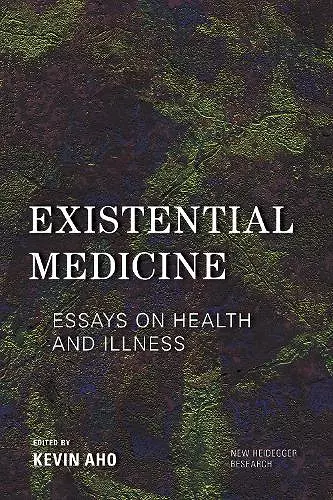Existential Medicine
Essays on Health and Illness
Format:Paperback
Publisher:Bloomsbury Publishing PLC
Published:23rd Apr '18
Currently unavailable, and unfortunately no date known when it will be back
This paperback is available in another edition too:
- Hardback£113.00(9781786604828)

Existential Medicine explores the recent impact that the philosophies of existentialism, phenomenology, and hermeneutics have had on the health care professions. A growing body of scholarship drawing primarily on the work of Martin Heidegger and other influential twentieth-century figures such as Maurice Merleau-Ponty, Jean-Paul Sartre, and Hans-Georg Gadamer has shaped contemporary research in the fields of bioethics, narrative medicine, gerontology, enhancement medicine, psychiatry and psychotherapy, and palliative care, among others. By regarding the human body as a decontextualized object, the prevailing paradigm of medical science often overlooks the body as it is lived. As a result, it fails to critically engage the experience of illness and the core questions of ‘what it means’ and ‘what it feels like’ to be ill. With work from emerging and renowned scholars in the field, this collection aims to shed light on these issues and the crucial need for clinicians to situate the experience of illness within the context of a patient’s life-world. To this end, Existential Medicine offers a valuable resource for philosophers and medical humanists, as well as health care practitioners.
Kevin Aho has brought together a unique and valuable collection of new essays by leading authorities in existential, phenomenological and hermeneutic approaches to medicine. This collection provides state-of-the-art work on such phenomena as anxiety, authenticity, aging, pain, medical ethics and the limits of medicalization. It is a must-read for anyone interested in what philosophy can contribute to the health sciences. -- Charles Guignon, Professor Emeritus of Philosophy, University of South Florida
This masterful collection of essays demonstrates the promise of Heidegger’s phenomenology for understanding the complex unity of lived, embodied, intercorporeal, affective, and hermeneutic components of pain and suffering. Spanning topics in existential psychiatry, phenomenologies of chronic pain and aging, medical technologies, health and illness, Existential Medicine is a must-read for health professionals and everyone else grappling with the vulnerabilities of the human condition. -- Daniel O. Dahlstrom, Professor of Philosophy, Boston University
Existential Medicine is a stellar collection of philosophical essays, written by the leading scholars in the field. The volume draws on the phenomenological-existential tradition, and addresses contemporary issues in medical practice, including themes such as psychiatry, embodiment, death and pain, health, and technology. Illness stands at the intersection of biology and natural science on one hand and personal meaning and subjective experience on the other – the previously transparent body and homeliness of the world profoundly altered by ageing, illness, suffering and pain. This edited volume will be a superb resource for health care practitioners, philosophers, and wider colleagues in policy and academia. -- Matthew Broome, Director of the Institute for Mental Health, University of Birmingham, UK
[…] remind[s] the readers of this society of an important area where humanistic practitioners, scholars and researchers — those who are sensitive to the existential dimension of human being — are needed today. * Journal of the Society for Humanistic Psychology *
In 1954 philosopher Martin Heidegger published an influential essay entitled "The Question Concerning Technology," in which he argued that modern technology had joined forces with science to dictate the encompassing framework of human life. Everyone is subject to the scientific dogma that only "what is measurable is real." During the 1960s Heidegger became interested in psychiatry and psychotherapy. In a series of seminars he gave in Zollicon, Switzerland, he set himself against the "scientific dogma." The human body, he said, is not just another object in the world. It is "an effective, situated and embodied existence." The 16 essays in this collection elaborate on this premise. The scholarship is impressive although not always convincing. One reads, for example, that "while health care today is more effective that ever at keeping human beings alive it has never been more estranging." It is not clear how or why this is so. Or again Heidegger calls his method a form of "poetizing" or "projective saying." One hears in these essays echos of Heidegger's well-known animus against modernity. One also senses a pervasive reliance on the language of phenomenology. This is a book for medical ethicists.
Summing Up: Recommended. Graduate students, researchers, faculty.
… the collection of essays in Kevin Aho’s inspiring publication is an invitation to join the exploration of phenomenology and existential medicine and find new potentials for philosophy of medicine within these traditions. Existential Medicine is a well-balanced but also composite collection of essays, a rhizome of Heidegger-medicine-hybrids that cover a remarkable amount of ground within the medical sphere. We join the many skillful thinkers who have contributed to the volume in an exploration of the possibilities for phenomenology—and particularly Heideggerian thought—to contribute in manifold ways and in a variety of debates within philosophy of medicine. … For the essay collection Aho has managed to curate a book that touches upon an impressive range of philosophical and medical fields. Particularly it is enjoyable that the collection has such a strong emphasis on illnesses that are typically considered somatic, thus succeeding in moving existential medicine beyond the psychiatric realm within which the use of philosophy—and particularly the use of existential philosophy—in medicine is sometimes stuck. * Phenomenological Reviews *
Kevin Aho’s masterfully selected collection is an excellent showcase
of the contributions that phenomenology, hermeneutics, and existentialism
can make to medicine. The volume features insights by major
contributors to the field of medical humanities, inspired by the work of
Heidegger and Gadamer, among others.
ISBN: 9781786604835
Dimensions: 221mm x 153mm x 22mm
Weight: 445g
294 pages